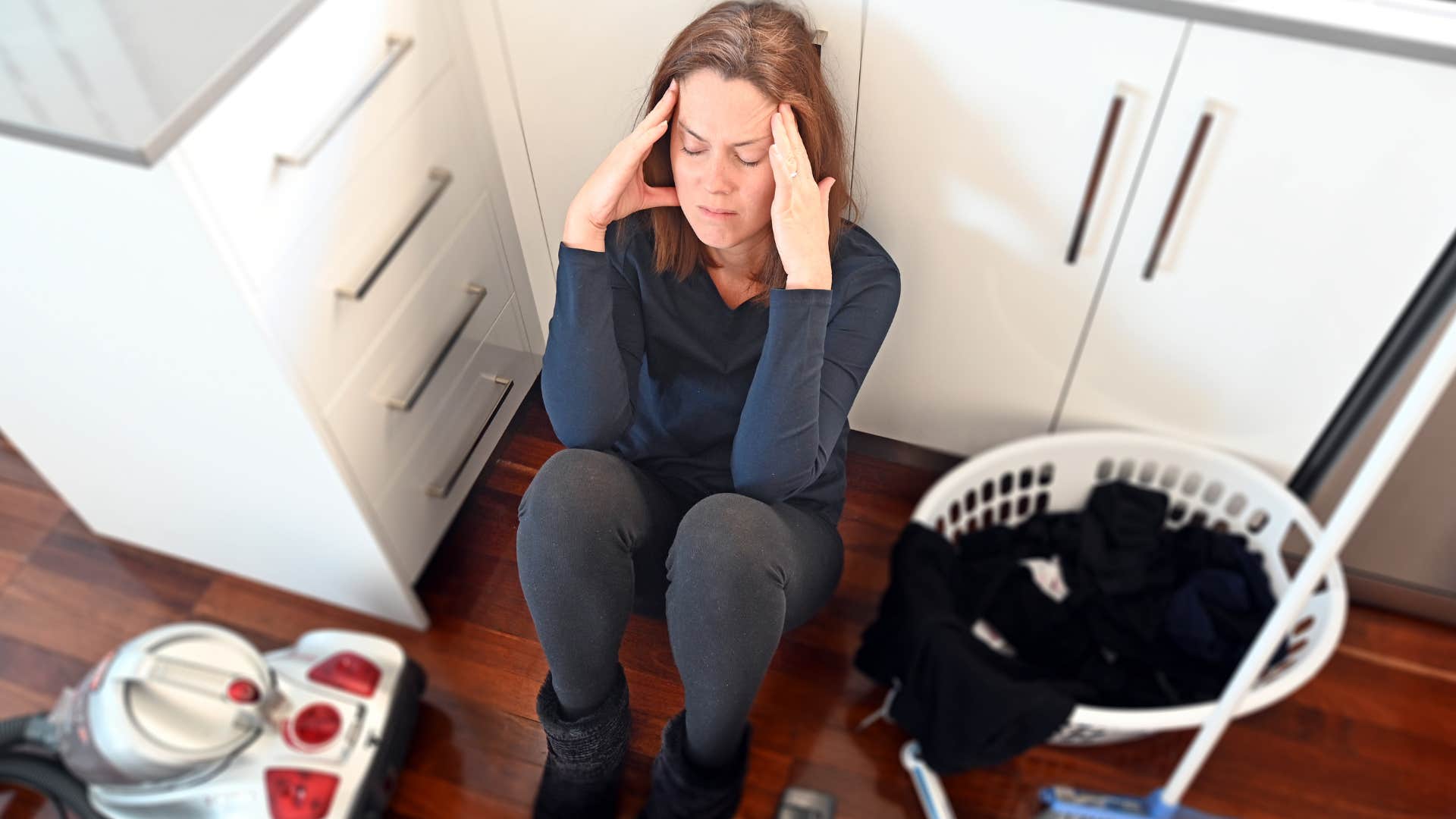11 Signs You Grew Up With Lazy Parents In A Messy House & It Still Affects You Today, According To Psychology
Don't underestimate the consequences of unmet needs in childhood.
 Krakenimages.com | Shutterstock
Krakenimages.com | Shutterstock While there are certainly a number of innocent reasons why you might have grown up in a messy home that have nothing to do with having "lazy" parents — from not having enough time, to not having enough help, and even facing socioeconomic barriers — there are still several consequences children experience from living in clutter.
From promoting stress, to increasing the risk of depression and anxiety, and even decreasing concentration and focus, a messy house can sabotage a child's developmental process, both internally and externally, in ways that follow them into adulthood. In fact, many of the signs you grew up with lazy parents in a messy house and it still affects you today, according to psychology, aren't just about the physical clutter or mess, but a parent's attitude about protecting their kids by making sure they had a clean environment to thrive within.
Here are 11 signs you grew up with lazy parents in a messy house and it still affects you today, according to psychology
1. You struggle with executive functions
 Ekateryna Zubal | Shutterstock
Ekateryna Zubal | Shutterstock
Children who grow up in chaotic environments or households tend to struggle with executive functioning as they get older — from organizing, to planning, and even regulating thoughts and emotions.
"Lazy" parents, who prefer to prioritize their comfort above things like cleanliness, disciplined parenting, or even open communication with their kids, can spark these struggles, but living in a messy house tends to have the same consequences all the same.
If kids don't have a clean and clear space to unpack their emotions, have conversations, and de-stress, they continue to carry the emotional burdens of their day with them over-and-over again.
In adulthood, they may have a cleaner environment or be more prone to compensating for the messiness they tolerate growing up around their parents, but the consequences from the mental clarity they missed out on may still linger.
2. You associate messiness with comfort
 PR Image Factory | Shutterstock
PR Image Factory | Shutterstock
While many kids do learn to prioritize cleanliness in their living spaces later in life to compensate for the lack of it in their parents' homes, it's also possible that they'll continue to live in a mess because it's unnervingly familiar and comfortable.
While messiness is in some ways associated with higher creativity, there are certainly trade-offs for people who continue to live in disorderly environments in adulthood, according to a study from Psychological Science. From struggling with healthy choices to grappling with stress, a messy living space can make mental clarity and emotional security hard to achieve.
3. You feel shame about your space
 DimaBerlin | Shutterstock
DimaBerlin | Shutterstock
According to relationship specialist and coach Annie Tanasugarn, it's not uncommon for adult children to grapple with deep-rooted shame from their childhoods, as a result of living in a messy home, having "lazy" parents, or even continuing to struggle with unresolved traumas and experiences.
This internalized shame can sometimes manifest subtly, like never hosting at your place or cleaning more than usual when people come over, but it can also affect the wellness of your relationships.
If you're not fully understanding of the shame you've been living with, it can manifest in behaviors that sabotage connections and social interactions — like overcompensating with people-pleasing tendencies or leading with insecurity, instead of empathy, toward others.
4. You're sensitive to judgment
 simona pilolla 2 | Shutterstock
simona pilolla 2 | Shutterstock
For many adult children, childhood trauma — even if it's battling shame around a messy house or having lazy parents who prioritized themselves over your needs — could be fueling their anxiety and fear of judgment later in life, according to clinical psychologist Lori Lawrenz.
Whether it's internalized shame or lingering anxiety from having unmet needs in childhood, fears of judgment, rejection, or even abandonment often follow adult children later in life, negatively affecting their self-esteem, mental health, and relationships.
By recognizing this as a symptom of having lazy parents or even growing up in a messy, uncertain, and sometimes chaotic household, adult children can find ways to cope with their unresolved trauma, rather than letting it linger and spiral into resentment, anxiety, and insecurity.
5. You're avoidant
 Prostock-studio | Shutterstock
Prostock-studio | Shutterstock
Whether you've developed an avoidant personality at work or even avoidant tendencies in a relationship, associating neglect with love and care is one of the signs you grew up with lazy parents in a messy house and it still affects you today.
Parents who didn't feel the need to craft a safe space for their kids or maintain a level of cleanliness in their homes spark this mentality in their kids, who learn to believe that not taking care of things is what love truly looks like.
6. You struggle with routines
 Pheelings media | Shutterstock
Pheelings media | Shutterstock
According to a study from the European Journal of Trauma & Dissociation, childhood trauma can manifest in a number of diverse ways for adult children, but oftentimes it's associated with low self-esteem, anxiety, and depression later in life. When you're struggling with the emotional turmoil of those things, alongside other responsibilities and relationships, finding a routine that truly works can feel overwhelming.
Especially for kids that grew up with lazy parents that fell short on teaching them the importance of self-discipline, healthy habits, and routines, it's much harder for them to relearn how fundamental it can be to physical and mental health later in life.
7. You're hyper-independent
 fizkes | Shutterstock
fizkes | Shutterstock
Often triggered by childhood trauma and unmet needs, hyper-independence — doing everything yourself, never trusting other people, and feeling anxious about long-term relationships — is one of the signs you grew up with lazy parents in a messy house and it still affects you today.
According to the Newport Institute, hyper-independence is often a stress response to not having enough support or guidance. Adult children feel pressured to take care of themselves without help from anyone else, because they were forced to do the same growing up.
8. You struggle with low self-worth
 fizkes | Shutterstock
fizkes | Shutterstock
Many people who struggle with childhood trauma also struggle with insecurity or low self-esteem, according to a study from the European Journal of Psychotraumatology. When you grow up with lazy parents, who not only refuse to clean up after themselves but also fall short on truly looking after you, it's impossible to not struggle with feeling "less than" or "unworthy" of love.
In relationships later in life, this low self-esteem can urge adult children to seek out neglectful partners that mirror their parents out of familiarity or even avoid intimate connections altogether, fueled by their anxiety and hyper-independence.
9. You avoid chores
 ChameleonsEye | Shutterstock
ChameleonsEye | Shutterstock
Similar to the way unmet needs and lazy parents can spark avoidant tendencies in relationships for their adult children, avoiding chores and household responsibilities is another one of the signs you grew up with lazy parents in a messy house and it's still affecting you today.
Like psychologist Carl E. Pickhardt suggests, for children to feel confident in their ability to do chores, maintain a routine, and prioritize cleanliness later in life, they need to have parents who structure their routines as kids.
Starting chores early, being a great role model at home, and even disciplining healthily to push their kids to complete their tasks are all key experiences for kids growing up that teach them important skills and the fundamentals of caring for their own well-being.
10. You fear being seen as 'lazy'
 voronaman | Shutterstock
voronaman | Shutterstock
In the same way you may have grown resentful of your parents for being lazy growing up, it's possible you fear that same judgment today. You're hypervigilant about keeping your living space spotless, never skip a chore, or maybe try to keep people from seeing your space to avoid criticism, even when it's entirely unfounded.
Even if you don't recognize it as one of the signs you grew up with lazy parents in a messy house, this deep-rooted fear and anxiety has more to do with unmet needs and experiences in childhood than it does with your relationships and social connections today.
11. You're conflicted about becoming a parent
 Krakenimages.com | Shutterstock
Krakenimages.com | Shutterstock
Experiencing unmet needs or childhood trauma early in life is often associated with less desire to get married, have children, and start a family, according to a study published in Psychiatry Investigation. Of course, it's not uncommon for people to question their ability to parent or their capacity to be a good one, considering they never had a role model to look up to or skills from great parents instilled within them.
While it's entirely possible to unlearn trauma, build new skills, and become a great parent, even with poor parents growing up, it can be a barrier when you've only ever seen love expressed as neglect.
Zayda Slabbekoorn is a staff writer with a bachelor's degree in social relations & policy and gender studies who focuses on psychology, relationships, self-help, and human interest stories.

